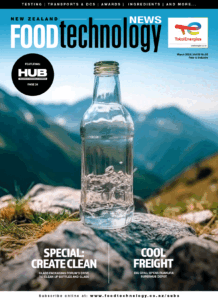Research undertaken by the Riddet Institute will contribute to a global conversation about the future of sustainable food production and food security as part of the UN’s international food systems summit.
In September this year, the UN will launch bold actions to transform the way the world produces and consumes food, in New York, and governments, organisations and individuals have been invited to input and suggest initiatives.
The summit will explore whether the world produces enough food for its inhabitants and discuss, in a post-Covid world, how to do so sustainably and equitably.
The Riddet Institute will help decision-makers understand the food system debate by convening an evidence-based New Zealand dialogue event in June, on topics related to global food system sustainability.
“Both in New Zealand and globally, our food system is coming into sharp focus, particularly with a global pandemic and climate change, changing the way we think about and produce our food. New Zealand’s reputation for high quality, premium food products needs to fit with the hungrier world of the future, but our penchant for innovation and ingenuity can certainly contribute too,” says Riddet Institute scientist Dr Nick Smith.

Distinguished Professor Paul Moughan
“Some believe that we could feed everyone if we distribute food equally and reduce food waste, currently estimated at around a third of production. Others state the solution lies in a wholesale shift of diets, but many cultural, regional, environmental and economic challenges would hamper this approach. Knowing for sure what the best course of action will be is challenging. Especially, as we will have an additional 2.5 billion people to feed by 2050, making the problem an urgent one.”
Riddet Institute research in the area is focussed on nutrient quality, sustainable production, food security and food systems.
The institute’s Distinguished Professor Paul Moughan will submit a briefing document to the summit on his work which shows that nutrients on the label do not translate to the nutrients that the human body is able to get from that food and eating more (or less) isn’t always the answer.
“Nutrient quality in foods is key, as is affordability and security of your food supply to enable consistent nutrients for health over a lifetime. This is a complex puzzle for individuals and policymakers to solve,” he says.
The Riddet Institute is concerned that environmental and economic factors are starting to override considerations of human nutrition when it comes to food.

Dr Nick Smith
Dr Nick Smith, who is on the institute’s Sustainable Nutrition Initiative team, works on the DELTA Model which considers the interrelated factors of the food system to calculate what food production and supply conditions are needed to nourish the world.
“This is more than just calories: the model considers the vitamins and minerals needed for good health and development; aspects not always considered in the popularized debate of extremes,” Smith says.
“The model suggests we need to do more than just reduce food waste: while this is good for delivering more calories, a lot of important micronutrients are found in low-wasted foods. The grand dietary shifts often proposed do not always measure up for complete nutrition. DELTA takes a nutrition-first perspective, as the food system of the future must be nutritionally sustainable, as well as environmentally.”































































































